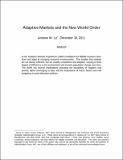| dc.contributor.author | Lo, Andrew W. | |
| dc.date.accessioned | 2012-12-11T14:36:04Z | |
| dc.date.available | 2012-12-11T14:36:04Z | |
| dc.date.issued | 2012-05 | |
| dc.identifier.issn | 0015-198X | |
| dc.identifier.issn | 1938-3312 | |
| dc.identifier.uri | http://hdl.handle.net/1721.1/75362 | |
| dc.description.abstract | In the adaptive markets hypothesis (AMH) intelligent but fallible investors learn from and adapt to changing economic environments. This implies that markets are not always efficient but are usually competitive and adaptive, varying in their degree of efficiency as the environment and investor population change over time. The AMH has several implications, including the possibility of negative risk premiums, alpha converging to beta, and the importance of macro factors and risk budgeting in asset allocation policies. | en_US |
| dc.language.iso | en_US | |
| dc.publisher | CFA Institute | en_US |
| dc.relation.isversionof | http://dx.doi.org/10.2469/faj.v68.n2.6 | en_US |
| dc.rights | Creative Commons Attribution-Noncommercial-Share Alike 3.0 | en_US |
| dc.rights.uri | http://creativecommons.org/licenses/by-nc-sa/3.0/ | en_US |
| dc.source | MIT web domain | en_US |
| dc.title | Adaptive Markets and the New World Order | en_US |
| dc.type | Article | en_US |
| dc.identifier.citation | Lo, Andrew W. “Adaptive Markets and the New World Order (corrected May 2012).” Financial Analysts Journal 68.2 (2012): 18–29. | en_US |
| dc.contributor.department | Sloan School of Management | en_US |
| dc.contributor.mitauthor | Lo, Andrew W. | |
| dc.relation.journal | Financial Analysts Journal | en_US |
| dc.eprint.version | Author's final manuscript | en_US |
| dc.type.uri | http://purl.org/eprint/type/JournalArticle | en_US |
| eprint.status | http://purl.org/eprint/status/PeerReviewed | en_US |
| dspace.orderedauthors | Lo, Andrew W. | en |
| dc.identifier.orcid | https://orcid.org/0000-0003-2944-7773 | |
| mit.license | OPEN_ACCESS_POLICY | en_US |
| mit.metadata.status | Complete | |
